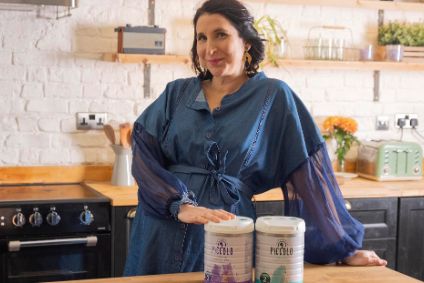
UK better-for-you baby food brand Piccolo has launched baby formula products to liven up what it sees as an “old-fashioned” category.
Piccolo’s organic first infant, follow-on and growing-up milk were launched last month in Sainsbury’s and Boots, as well as via online retailer Ocado.

Discover B2B Marketing That Performs
Combine business intelligence and editorial excellence to reach engaged professionals across 36 leading media platforms.
The company believes there is room for premiumisation in the category. The organic milk used to make its infant milks is sourced from certified organic farms and meets EU organic requirements.
Piccolo says it has partnered with experts with 35 years’ experience in infant nutrition to develop the products and is sourcing milk from family farms. The formula is palm oil-free and its packaging is recyclable.
Cat Gazzoli, founder of the London-based business, told just-food her own circumstances – she is nearly nine months pregnant – convinced her to move into baby formula.
“In the UK, 76% of all women with dependent children are working. Generally, breast feeding means you can’t be away from your child,” she said.

US Tariffs are shifting - will you react or anticipate?
Don’t let policy changes catch you off guard. Stay proactive with real-time data and expert analysis.
By GlobalData“It was on my mind because I wanted a second child but had a different level of responsibility at 42 and wanted options. With me, it [breast feeding] would mean not seeing our customers for six or nine months. It’s my choice to have flexibility.
“The average age to have a child in the UK is 31 and the birth rate is 1.2. People are spending more on their children and many families have dual-income parents.”
Gazzoli is of the opinion that the “breast is best” approach has led to negative opinions about formula.
“Formula should not be demonised like it’s some sort of tobacco,” she said.
But she also believes the category has become staid.
“The baby formula market is a duopoly between Danone and Nestlé. This is a space with no challengers,” she said.
“I do not think the category has been modernised in terms of things like the tone of voice on the packaging and was ripe for change. It’s positive for the category, which is quite old-fashioned, to have more choice.”
Gazzoli said there are no plans at this stage to export baby formula.
With Piccolo’s fruit and vegetable-blended, organic baby food products, based on a Mediterranean diet, exports to Ireland, the Netherlands, South Africa and, most recently, China, where it has signed distribution deals with premium maternity stores and Alibaba’s online platform Tmall.
“People there are interested in the story and the provenance,” Gazzoli says.
Piccolo, which has a projected turnover this year of GBP7.5m (US$9.7m), also manufactures products such as sauces, stock cubes and pasta, which are aimed at parents who want to home cook for their young children. The company donates 10% of profits to charities linked to babies and child rearing.





